June 26, 2025 | 05:43 GMT +7
June 26, 2025 | 05:43 GMT +7
Hotline: 0913.378.918
June 26, 2025 | 05:43 GMT +7
Hotline: 0913.378.918
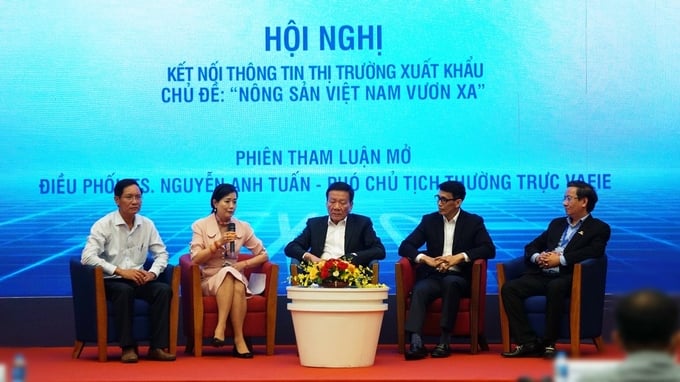
The Conference on Connecting Export Market Information with the theme "Vietnamese Agricultural Products Reach Far" took place in Ho Chi Minh City on May 26. Photo: Nguyen Thuy.
On May 26, within the framework of the Ho Chi Minh City Export Forum and Trade Fair 2023, a Conference on Connecting Export Market Information with the theme "Vietnamese Agricultural Products Reach Far" took place.
According to Mr. Nguyen Nguyen Phuong, Deputy Director of the Ho Chi Minh City Department of Industry and Trade, Vietnamese businesses have not yet effectively exploited the advantages of signed free trade agreements. The understanding of the demand for green consumption, conditions and regulations for imported goods, large markets, standards of sustainable production, etc. is also limited.
At the conference, speakers, experts, and businesses shared experiences and solutions to help businesses have timely understandings of market requirements, consumption trends, green production trends, sustainable production, and sustainable consumption so that other manufacturing and exporting businesses can consult and have appropriate solutions for bringing agricultural products and goods to the world market.
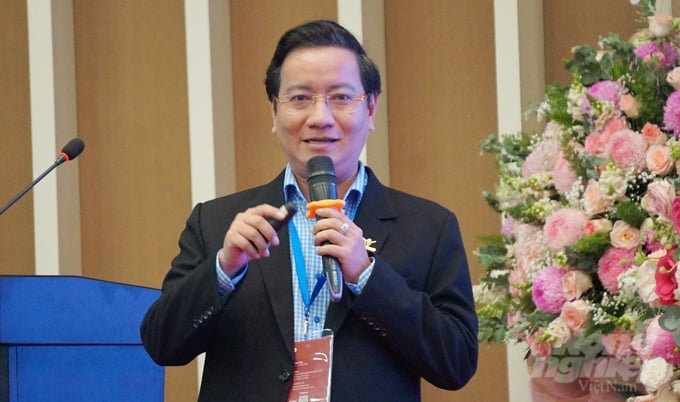
Mr. Nguyen Dinh Tung, Vice Chairman of the Vietnam Fruit and Vegetables Association and Chairman of Vina T&T Group, shared at the conference. Photo: Nguyen Thuy.
Sharing about the success story of exporting agricultural products to the world, Mr. Nguyen Dinh Tung, Chairman of Vina T&T Group, who successfully brought Ben Tre coconut to the US market in 2017, said that the offer of selling low-quality and cheap products does not help develop the market or brand for Vietnamese products and is in stark contrast to the way some countries do it.
For example, in New Zealand, in order to build a brand for apples and cherries, the government, ministries, sectors, and businesses have jointly chosen the most delicious and top-class fruits for export. The type 2 product is for domestic consumption, and the lower half is for processing. Therefore, to build a strong brand, product quality is the core and most basic factor.
Vina T&T Group has also succeeded in exporting many other Vietnamese agricultural products, such as Soc Trang star apple, Vinh Long sand mango, fresh coconut, pomelo, and dragon fruit. According to Chairman Nguyen Dinh Tung, one of the core values for the business’s success is quality and brand. In order to conquer the international market with high-quality products, first, the raw material area must be large enough, and the product must be specific compared to other products of the same type in the world and suitable for the importing country and object.
Second, along with building a technical team, the businesses need to closely work with farmers to build a sustainable linkage chain throughout the process, from variety selection to cultivation to harvest, ensuring quality and output to meet export standards as well as green and sustainable agriculture trends in the coming time.
At the same time, reinvest in facilities to ensure the best product quality is maintained for consumers, such as preliminary processing stations, fruit packaging and processing factories, cool and IQF storages meeting international standards, and the refrigerated vehicle system for transportation throughout the journey.
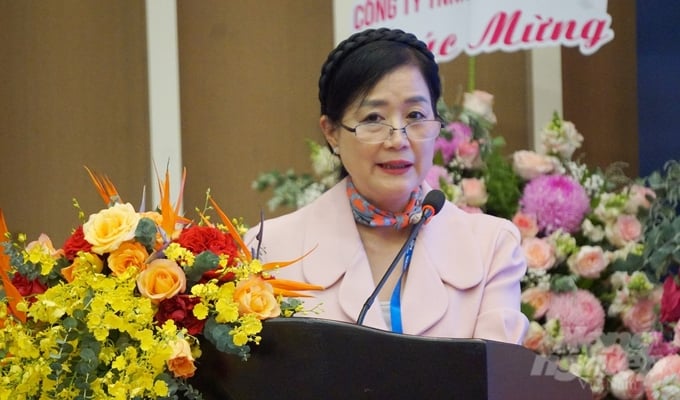
Ph.D. Ha Thuy Hanh, Vice Chairman of the Vietnam Farms and Agricultural Enterprises Association, shared at the conference. Photo: Nguyen Thuy.
According to Ph.D. Ha Thuy Hanh, Vice Chairman of the Vietnam Farms and Agricultural Enterprises Association, with the current requirements of international organizations, agricultural products must ensure not only quality and standards but also a number of green certifications, such as certifications of labor rate, gender, greenhouse gas emissions, etc. These are mandatory requirements for Vietnamese enterprises to target the export market in the near future. Therefore, circular agriculture is an inevitable trend in all fields, from animal husbandry to cultivation to aquaculture.
The solution to promoting circular agriculture is that enterprises need to lead farmers and cooperative groups to use technology in production as well as orient farmers to join the circular agricultural chain from raw material areas, post-harvest, preliminary processing, packaging, and transportation, thereby helping to reduce costs and improve the value of agricultural products.
In the past, circular agriculture mostly focused on improving production, but now it requires the application of technology such as microbial technology to reuse emissions and by-products. For example, the fields of livestock and aquaculture have almost thrown away nothing because everything is immediately purchased by people to produce and improve value. However, all stages must ensure the certification of cultivation, production, processing plants, etc. These are barriers for businesses today.
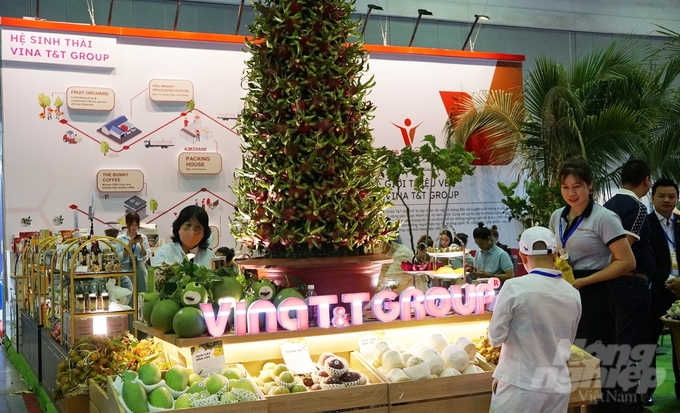
Vina T&T Group's stall with many typical regional agricultural products was displayed and introduced at the Ho Chi Minh Export Trade Fair 2023. Photo: Nguyen Thuy.
According to Ph.D. Huynh Kim Tuoc, Co-Chairman of the Committee on Digital Economy and Technology, American Chamber of Commerce in Viet Nam (AMCHAM), Vietnam is one of the top 20 major exporting countries in the world. On the business platform without borders (online market), Vietnam is in the top 10 in the world in terms of trade and exports.
A new economy is located online, so implementing the digital economy helps online businesses be effective. "Coming here, AMCHAM will work with the industry and trade sector to provide training, specific drilling on e-commerce, and "on-job training" businesses to step-by-step make products meet international standards so that they can do cross-border business," said Ph.D. Huynh Kim Tuoc.
Linkage for joint development
Mr. Huynh Thanh Su, Deputy Director of the Can Tho Department of Industry and Trade, said that Can Tho and 13 Mekong Delta provinces have signed regional linkages and linkages with Ho Chi Minh City in all fields to sustainably develop the agricultural sector in particular and the economy and society in general.
Sharing the same opinion, Ph.D. Ha Thuy Hanh said that production linkage is an inevitable need in the current context. Therefore, linkage is necessary and aims to create uniform products and large raw material areas to serve processing factories, thereby reducing logistics costs. "Recently, many processing factories do not have enough input products," she said.
Ph.D. Ha Thuy Hanh acknowledged that the current practice of exporting unofficial-quota goods to China is very difficult and impossible. Therefore, it is mandatory to export officially, associate, and obtain certifications.
In the past, "exporting at one’s own discretion and preference" was acceptable, but it is not suitable for the present time. The role of leading enterprises is very important, not only in guiding farmers through the cultivation process, planning, and production according to the requirements of importers and in terms of certification, but also in providing more training for farmers on the issues of joint production and e-commerce transaction culture to create more sustainable common products and develop them together.
Translated by Huyen Vu Thu
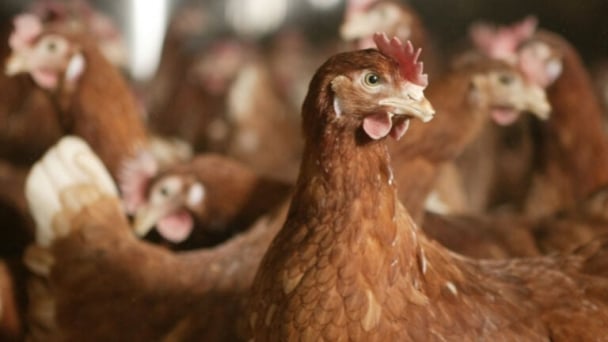
(VAN) Research has shown that Hy-Line brown hens may be better suited for cage-free production based on overall greater egg production and other quality metrics.
![Turning wind and rain into action: [9] Digitizing hydrometeorological data in response to climate change](https://t.ex-cdn.com/nongnghiepmoitruong.vn/608w/files/news/2025/06/17/z6704423696987_15fd32ffc26d590d204d520c9dac6786-nongnghiep-165943.jpg)
(VAN) Farmers have begun accessing hydrometeorological applications to adjust their cropping schedules, aiming to ensure productivity and adapt to climate change.
![Turning wind and rain into action: [8] Real-time salinity detection and early warning technology](https://t.ex-cdn.com/nongnghiepmoitruong.vn/608w/files/news/2025/06/17/z6704423696987_15fd32ffc26d590d204d520c9dac6786-nongnghiep-151127.jpg)
(VAN) Thanks to the integration of modern hydrological-hydraulic models, remote sensing technologies, and artificial intelligence, the accuracy of hydrological forecasting has significantly improved.
![Turning wind and rain into action: [7] Early disaster warnings help marine farmers minimize losses](https://t.ex-cdn.com/nongnghiepmoitruong.vn/608w/files/news/2025/06/17/z6704423696987_15fd32ffc26d590d204d520c9dac6786-nongnghiep-142942.jpg)
(VAN) In recent years, thanks to early disaster warnings and forecasting, marine farmers in Khanh Hoa province have been able to reduce risks and losses, thereby improving production efficiency.
![Turning wind and rain into action: [6] ‘Four on-the-spot’ disaster management software](https://t.ex-cdn.com/nongnghiepmoitruong.vn/608w/files/news/2025/06/17/e5a48259d6a262fc3bb3-nongnghiep-183800.jpg)
(VAN) By simply activating the scenario on the disaster management software, the relevant authorities immediately know how many households need to be evacuated, where to evacuate them to, and by what means of transportation…
![Turning wind and rain into action: [5] Hue applies modern technology in disaster forecasting](https://t.ex-cdn.com/nongnghiepmoitruong.vn/608w/files/news/2025/06/17/z6704423696987_15fd32ffc26d590d204d520c9dac6786-nongnghiep-093938.jpg)
(VAN) In Hue city, modern technology has recently been applied in meteorological and hydrological forecasting and warning, helping to reduce the damage caused by natural disasters.

(VAN) A cutting-edge farming technique being implemented on an experimental ranch in Arizona's Sonoran Desert has already saved a billion gallons of water over five years, according to Civil Eats.